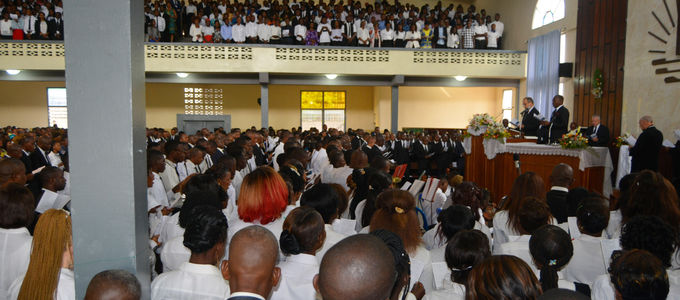Comfort and suffering that lead into the kingdom of heaven
The bad news: without suffering there is no path that leads into eternal glory. The good news: this is not a matter of human need. And there is also divine help. A divine service about suffering in Christ.
It was a familiar old Bible text that Chief Apostle Jean-Luc Schneider unravelled anew in Kinshasa on 29 July 2018: “For our light affliction, which is but for a moment, is working for us a far more exceeding and eternal weight of glory, while we do not look at the things which are seen, but at the things which are not seen. For the things which are seen are temporary, and the things which are not seen are eternal” (2 Corinthians 4: 17-18).
Suffering that brings no salvation
“This is a beautiful message of comfort,” he explained. “Our affliction is light. It will not last forever. Just think of the glory that God will grant you: it will be for all eternity!!” However, the experience of suffering, sickness, grief, or injustice does not bring us salvation. For many people it is actually quite the opposite: it is because they suffer, because they are in distress, because they have been treated unjustly, that they distance themselves from God. Their sufferings do not bring them any closer to Him.”
“You could just as easily enter into the kingdom of God when you are healthy, when things are going well for you, or when you lack for nothing,” emphasised the Church leader before going on to ask, “But what did Apostle Paul mean by this? Well, as usual, we will have to read the whole chapter, the whole epistle, in order to explain this.
Suffering with and for Christ
“In the second letter to the Corinthians, Apostle Paul talks about suffering in Christ,” said the Chief Apostle. He then listed five key aspects of this suffering:
- Temptation: “Those who do not concern themselves with the commandments also have success in life.” — “People at times consider us weaklings or cowards because we do not repay evil with evil.”
- Repentance: “Those who follow Christ will also suffer because of their own shortcomings.”
- Giving up certain things: “We want to renounce all ideas that are not in harmony with those of Jesus. This will entail a battle.” — We also suffer pain, on the one hand because the old Adam must be put to death, and on the other hand, so that the new creation within us may develop and eventually reveal itself.”
- Love: “If we love our neighbour, we will share in his sufferings. We will share the sufferings of others.” — “This too is a kind of suffering that especially affects those who follow Christ: their love for others is not always reciprocated.”
- Sadness: “We wish that all people would be saved! But there are still so many who do not accept the testimony of Christ, and this causes us pain.”
Comforted by Christ
“Paul suffered a great deal for the sake of Christ,” continued the Church leader. “He even stressed that all of these sufferings were beyond his strength, and he thought that he was going to die.” Why then does the Apostle of old say that our affliction is light? I find the answer to this question in the introduction to this letter: “For as the sufferings of Christ abound in us, so our consolation also abounds through Christ.”
The Chief Apostle also mentioned three aspects in reference to this consolation:
- “When we suffer for the sake of Christ, He comforts us with the words, “Be of good cheer. I have overcome the world” (John 16: 33).
- “It is particularly when we suffer for Christ that we can make extraordinary experiences in the divine service. Thereby Jesus shows us: ‘I am there. I am with you.’”
- “In the word and in Holy Communion, He grants us the strength to gain victory over the devil, to resist temptation, to continue in love, and to persevere in the battle for our salvation.”
“Those who take it upon themselves to suffer for the sake of Christ are working on their own salvation,” concluded Chief Apostle Schneider. “Those who disengage themselves from anything that could trouble their fellowship with God thereby strengthen this fellowship and so prepare themselves for eternal fellowship with God. And those who suffer because there are so many who reject salvation thus prepare themselves for their future activity as priests of God and of Christ in the thousand-year kingdom of peace. This is one of the reasons why we have become children of God, New Apostolic Christians.






















